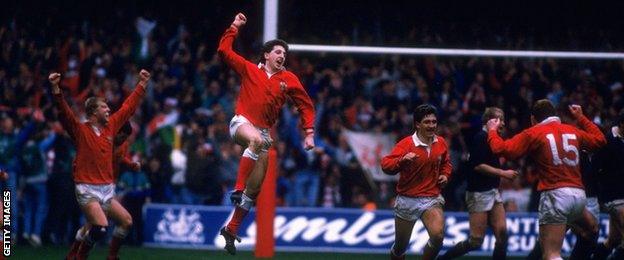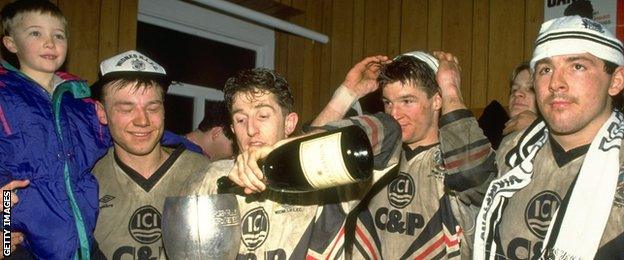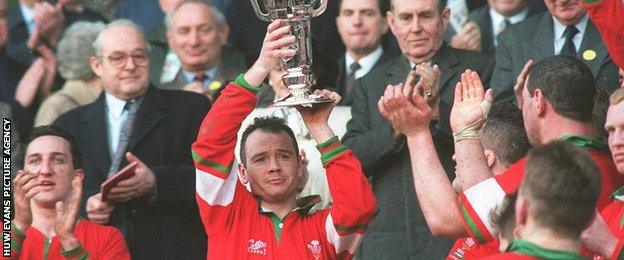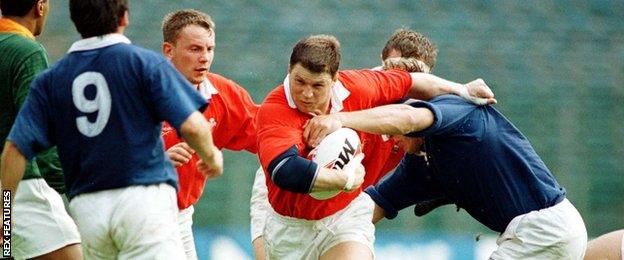Jonathan Davies: 30 years on from the day he switched to Rugby League
- Published
Jonathan Davies recalls the 'ridiculous scenes' when he moved north
Saturday, 7 January 1989 was a landmark in Wales for both codes of rugby.
It was a calm, mild day in Cardiff but a storm was about to burst as Welsh rugby union's brightest star and national team captain, fly-half Jonathan Davies, was presented to the world by Widnes as a rugby league player.
It was a move that sent shock waves through both codes.
Doug Laughton, Widnes' coach, had pulled off the coup of a lifetime, but for Welsh rugby union it was a blow that had long lasting repercussions.
In the next six years a steady flow of top Welsh talent followed Davies to the north of England.
Paul Moriarty and John Devereux in 1989; Dai Young and Rowland Phillips in 1990; Mark Jones and Allan Bateman in 1991; Scott Gibbs and Scott Quinnell in 1994.
It was an exodus that simultaneously wrecked the Wales union team's revival of 1987-88 and helped make the Wales rugby league team a force to be reckoned with in the 1990s.
But as this is Wales we're talking about, let us begin at the beginning.
Welsh revival
After a series of indifferent seasons following the end of their golden era in the 1970s, things were looking up for Wales in the second half of the 1980s.
They finished third in the inaugural World Cup in 1987 and had claimed a Triple Crown and been agonisingly close to a Grand Slam in the 1988 Five Nations championship.
But their three losses against New Zealand in those years were probably more significant.
Scorelines of 49-6, 52-3 and 54-9 signalled a gulf in class greater than the distance travelled between the two countries.

Davies celebrating Wales' 25-20 win against Scotland on the way to the Five Nations Triple Crown in 1988
The All Blacks were harbingers of union's professional future - years ahead of their time - displaying levels of technique, physicality and skill which even the most talented northern hemisphere teams were unable to match.
But Davies was the shining light for Wales and was made captain for the autumn internationals against Samoa and Romania.
As it turned out the 15-9 defeat by Romania in December 1988 - for which the fly-half took the brunt of the media blame - was the last time fans saw Davies in a rugby union shirt for six years.
Speaking in the BBC's 2018 TV documentary Codebreakers, Davies said the only reason he accepted the offer from Widnes was financial.
He had a young family he needed to look after - and in amateur Welsh rugby there were no earnings to match his considerable public profile.
Wales' record in the Five Nations 1989-1995 |
|---|
1989: Bottom (One win out of four) |
1990: Bottom (Whitewashed) |
1991: Bottom (One draw, three defeats) |
1992: Fourth (two wins out of four) |
1993: Bottom (One win out of four) |
1994: Champions (Three wins out of four) |
1995: Bottom (Whitewashed) |
Joining Widnes for a record fee of £230,000 secured their future and, as it turned out, opened a brilliant new chapter in his career as a player.
Many doubted his ability to make the switch to the rigours of tackling full-time professional athletes on a weekly basis.
But Laughton, while careful about introducing Davies gradually to the rough and tumble of league, had no doubt about his potential as a player and his impact at the box office.
In his 2003 autobiography "A Dream Come True - A Rugby League Life" Laughton recalled how Davies' arrival put an extra 10,000 spectators on the gate for a match against Salford and attracted reporters from all over the world.
Davies, speaking for a Welsh language broadcast in January 2018, recalled the media circus with amusement.
"I remember everything that went on around the time I signed and when I first went up to Widnes," he said.
"I would never have believed there would be so much fuss. And I remember Dougie Laughton saying that if he'd known how much fuss there was going to be he wouldn't have signed me."

Jonathan Davies, with John Devereux at his elbow, celebrates Widnes' victory in the 1992 Regal Trophy final
The media circus emphasised the size of the gamble for Laughton . . . and for the player.
"I was captain of Wales, and the shock that happened down there was tremendous," Davies said.
"If I'd have failed, I would never, ever have been able to go back.
"If I'd failed I couldn't go anywhere - I couldn't go home. I'd have just had to get a normal job and give my rugby up."
Laughton's faith and signing on fee were repaid in full.
Widnes, with Davies, beat Canberra Raiders in the 1989 World Club Challenge.
And when Widnes hit tough financial times Davies switched to Warrington, being named the Man of Steel in 1993.
In Australia he was a hit at the Bulldogs and the Cowboys and for Great Britain his match-winning try against the Kangaroos in 1994 - a thrilling amalgam of cocky confidence and searing pace - remains a firm favourite among fans of all codes.

Wales won the Five Nations in 1994, but captain Ieuan Evans found it difficult to smile after losing 15-8 to England at Twickenham
Tough times in Wales
Whether or not it was just coincidence, Wales' rugby union team's form collapsed following the departure of Davies.
The national team went into freefall, haemorrhaging talented players to the professional game and suffering a series of set-backs on the field.
They were bottom of the Five Nations five times in the next seven seasons and were eliminated in the pool stages at the 1991 and 1995 World Cups.
Even when things went well, as they did in 1994, when Wales won the Five Nations championship, it was a bittersweet experience.
The look on captain Ieuan Evans' face as he lifts the trophy after a defeat by England in their final match speaks volumes.
And at a time when we are anticipating the arrival of a new Wales coach for the first time in 11 years, it's worth remembering between 1988 and the end of 1995, six men had held that post.
Tony Gray, John Ryan, Ron Waldron, Alan Davies, Alex Evans and Kevin Bowring were the men in the hot seat. And in this instance, hot meant scalding.
Wales beat Western Samoa in an entertaining match at The Vetch in Swansea
13-man revival
While the 15-man side toiled, the Wales national rugby league team enjoyed heady days and nights of success.
Bolstered with the stars who had left rugby union and boasting talented players like Iestyn Harries, Keiron Cunningham and Anthony Sullivan who had been brought up in the 13-man game, Wales beat England 18-16 in the European Championship in 1995 and shone at the World Cup later that year.
They comfortably topped Group 3 with a 28-6 win over France in Cardiff and a hard-fought 22-10 victory against Western Samoa at a packed Vetch Field in Swansea.
England ended their dream with a 25-10 win at Old Trafford in the semi-final, but for a brief period rugby league stole the headlines from union in its south Wales heartland.
The end of amateurism
Things changed for good in 1995.
It was a Welshman, International Rugby Board chairman Vernon Pugh QC, who made the announcement rugby union would allow players to be paid for playing.
At a stroke it removed the incentive for the best players from Wales to trade their union futures for rugby league cash.

Scott Gibbs was the first rugby league player to return to play rugby union for Wales in this match against Italy in October 1996
Where once players had been harshly ostracised for even talking to a rugby league scout, the departed stars were welcomed back like prodigal sons.
Davies would play union again for Wales - his final game the last before the old National Ground was torn down to build what we now call the Principality Stadium.
Bateman, Gibbs and Quinnell went on British and Irish Lions tours as the supply of top class Welsh talent going to rugby league simply dried up.
Tough act to follow
It signalled the start of difficult years for the Wales rugby league team.
"[For Wales] it's very difficult now, because they're starting from grassroots. They haven't got the marquee players that used to come up from union," Davies told the Love Rugby League website in 2016.
"Both games, union and league, are professional now, and a lot of rugby union players don't go to rugby league any more.
"A lot of them aren't good enough! But a lot of them are earning too much money in union.
"So it's very difficult to see how Wales can get the marquee players unless they grow them themselves.
"At the moment, I think that's happening."
Time to reflect
Reflecting 30 years on, Davies's only regret was the timing of the move north.
If he had waited another eight months he undoubtedly would have been a British and Irish Lion.
As it is he is high on the list of the best players never to have represented the tourists.
"Looking back I think one thing I might have waited for was the Lions tour (of Australia) in 1989," he said.
"That's one thing I perhaps could have waited for.
"But coming from a council house in Trimsaran, losing my father young and after having had a knee injury very young to have that money for my family for playing rugby which I enjoyed I think it was the right thing to do."
Wales and the Lions' loss . . . rugby league's gain.
And if rugby league did have his best years - as some argue - well at least the cameras were there to record them for everyone's enjoyment.